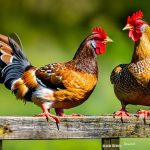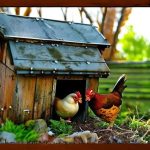Organic egg production has gained significant popularity in recent years as consumers become more conscious about the quality and source of their food. One important aspect of organic egg production is the practice of keeping chickens in open spaces. Unlike conventional egg production, where chickens are often confined to small cages, organic egg producers prioritize the well-being of the chickens by allowing them to roam freely in open spaces. This article will explore the benefits of organic eggs, the importance of open space for chickens, and the role of chicken coops in organic egg production.
Key Takeaways
- Organic eggs are produced by keeping chickens in open spaces.
- Organic egg production involves providing chickens with a natural environment and a healthy diet.
- Organic eggs are healthier and more nutritious than conventionally produced eggs.
- Open space is important for chickens as it allows them to engage in natural behaviors and reduces stress.
- Chicken coops play a crucial role in organic egg production by providing shelter and protection for chickens.
Understanding Organic Egg Production
Organic egg production refers to the process of raising chickens in accordance with organic farming standards and regulations. These standards prohibit the use of synthetic pesticides, antibiotics, and genetically modified organisms (GMOs) in chicken feed. Organic egg producers must also provide their chickens with access to outdoor areas where they can engage in natural behaviors such as foraging for insects and dust bathing.
Compared to conventional egg production, organic egg production places a greater emphasis on animal welfare and environmental sustainability. Chickens raised in organic systems are not subjected to overcrowded conditions or confined to small cages. Instead, they are given ample space to move around and exhibit natural behaviors. This results in healthier and happier chickens, which in turn leads to higher quality eggs.
Benefits of Organic Eggs
Consuming organic eggs offers several health benefits. Organic eggs are richer in essential nutrients such as vitamins A, E, and D, as well as omega-3 fatty acids. They also contain higher levels of antioxidants compared to conventional eggs. These nutrients contribute to better overall health and can help reduce the risk of chronic diseases such as heart disease and certain types of cancer.
In addition to their nutritional value, organic eggs are also better for the environment. Organic egg production practices prioritize sustainable farming methods that minimize the use of synthetic chemicals and promote biodiversity. By avoiding the use of pesticides and GMOs, organic egg producers help protect the soil, water, and air from pollution. Furthermore, the practice of allowing chickens to roam freely in open spaces helps maintain a balanced ecosystem by allowing them to forage for insects and control pests naturally.
Importance of Open Space for Chickens
Providing chickens with access to open space is crucial for their physical and mental well-being. Chickens are naturally curious and active animals that require space to move around, stretch their wings, and engage in natural behaviors such as scratching the ground and dust bathing. When chickens are confined to small cages or overcrowded conditions, they become stressed and more susceptible to diseases.
Open space also plays a significant role in the quality of eggs produced. Chickens that have access to open spaces are able to engage in natural foraging behaviors, which results in a more varied diet. This leads to eggs that are richer in nutrients such as vitamins, minerals, and omega-3 fatty acids. Additionally, chickens that have access to open spaces are exposed to natural sunlight, which helps increase the vitamin D content in their eggs.
Types of Open Spaces for Chickens
There are different types of open spaces that chickens can have access to, each with its own advantages and disadvantages. The most common types include free-range systems, pastured systems, and mobile housing systems.
Free-range systems allow chickens to roam freely outdoors during the day but provide them with shelter at night. This type of system allows chickens to exhibit natural behaviors and provides them with ample space to move around. However, free-range systems may pose challenges in terms of predator protection and maintaining a clean environment.
Pastured systems involve rotating chickens through different sections of a pasture or field. This allows chickens to have access to fresh grass and insects while preventing overgrazing. Pastured systems provide a more natural environment for chickens but require careful management to ensure the health of the pasture and prevent soil erosion.
Mobile housing systems involve using portable chicken coops that can be moved to different areas of a farm. This allows chickens to have access to fresh grass and insects while protecting them from predators. Mobile housing systems offer flexibility and allow for better management of the land, but they require regular moving and maintenance.
The Role of Chicken Coops in Organic Egg Production

Chicken coops play a crucial role in organic egg production as they provide shelter, protection, and a safe space for chickens to lay their eggs. Chicken coops should be designed to meet the specific needs of the chickens and comply with organic egg production standards.
There are different types of chicken coops available, including traditional fixed coops, mobile coops, and chicken tractors. Traditional fixed coops are permanent structures that provide a secure and comfortable environment for chickens. Mobile coops, as mentioned earlier, can be moved around to provide chickens with access to fresh grass and insects. Chicken tractors are similar to mobile coops but are designed to be lightweight and easily moved by hand.
Features of a Good Chicken Coop
A good chicken coop should have several important features to ensure the well-being of the chickens and the quality of the eggs produced. These features include proper ventilation, adequate space, nesting boxes, roosting bars, and predator protection.
Proper ventilation is essential to maintain good air quality inside the coop and prevent the buildup of moisture and harmful gases. Adequate space is necessary to allow chickens to move around comfortably and engage in natural behaviors. Nesting boxes provide a safe and comfortable place for hens to lay their eggs, while roosting bars allow them to perch at night.
Predator protection is crucial to ensure the safety of the chickens. Coops should be built with sturdy materials and secure doors to prevent predators such as raccoons, foxes, and snakes from entering. Additionally, the coop should have a secure fencing system to prevent predators from digging under or climbing over.
Factors to Consider in Building a Chicken Coop
When building a chicken coop for organic egg production, several factors should be considered to ensure the well-being of the chickens and compliance with organic farming standards. These factors include the size of the coop, the location, the materials used, and the design.
The size of the coop should be determined based on the number of chickens and their breed. Chickens require a certain amount of space to move around comfortably and engage in natural behaviors. The location of the coop should be chosen carefully to provide access to open spaces while protecting the chickens from extreme weather conditions and predators.
The materials used in building the coop should be safe, durable, and easy to clean. Organic egg production standards prohibit the use of certain materials such as pressure-treated wood that may contain harmful chemicals. The design of the coop should prioritize functionality and ease of maintenance.
Proper Maintenance of Chicken Coops
Proper maintenance of chicken coops is essential to ensure the health and well-being of the chickens and the quality of the eggs produced. Regular cleaning is necessary to remove droppings, feathers, and other debris that can harbor bacteria and pests. Coops should be cleaned at least once a week, and bedding material should be replaced regularly.
In addition to cleaning, chicken coops should be inspected regularly for any signs of damage or wear. Any repairs or replacements should be done promptly to prevent predators from entering or diseases from spreading. Coops should also be protected from extreme weather conditions by providing proper insulation and ventilation.
The Future of Organic Egg Production with Open Spaces and Chicken Coops
The future of organic egg production lies in prioritizing the well-being of chickens and promoting sustainable farming practices. Keeping chickens in open spaces allows them to engage in natural behaviors and results in higher quality eggs. Chicken coops play a crucial role in providing shelter, protection, and a safe space for chickens to lay their eggs.
As consumers become more conscious about the quality and source of their food, the demand for organic eggs produced by keeping chickens in open spaces is expected to increase. This will drive further innovation and improvements in organic egg production systems, including the design and functionality of chicken coops.
By continuing to prioritize the well-being of chickens and the environment, organic egg producers can contribute to a more sustainable and ethical food system. Consumers can support this movement by choosing organic eggs produced by keeping chickens in open spaces and advocating for stronger regulations and standards in the industry.
If you’re interested in learning more about how organic eggs are produced by keeping chickens in open spaces, you might find this article on poultrywizard.com helpful. It discusses the importance of chicken coop door size and how it can affect the well-being of your chickens. Additionally, if you’re considering turning a shed into a chicken coop, there are informative articles on the website that provide step-by-step instructions on how to do so. Check out this article on converting a shed to a chicken coop for more details.
FAQs
What are organic eggs?
Organic eggs are eggs that come from chickens that are raised in accordance with organic farming standards. This means that the chickens are fed organic feed, are not given antibiotics or hormones, and are allowed access to the outdoors.
What does it mean to keep chickens in open?
Keeping chickens in open means that the chickens are allowed to roam freely outdoors, rather than being confined to a small indoor space. This allows the chickens to engage in natural behaviors like scratching, pecking, and dust bathing.
Are organic eggs produced by keeping chickens in open?
Yes, organic eggs are produced by keeping chickens in open. Organic farming standards require that chickens have access to the outdoors, so organic egg producers must allow their chickens to roam freely outside.
What are the benefits of keeping chickens in open?
Keeping chickens in open has several benefits. It allows the chickens to engage in natural behaviors, which can improve their health and well-being. It also allows them to get exercise and fresh air, which can result in healthier, more flavorful eggs.
Are all organic eggs produced by keeping chickens in open?
Not all organic eggs are produced by keeping chickens in open. While organic farming standards require that chickens have access to the outdoors, the specifics of how much outdoor space is required and how long the chickens must be allowed outside can vary. Some organic egg producers may provide only minimal outdoor access, while others may allow their chickens to roam freely outdoors.
Meet Walter, the feathered-friend fanatic of Florida! Nestled in the sunshine state, Walter struts through life with his feathered companions, clucking his way to happiness. With a coop that’s fancier than a five-star hotel, he’s the Don Juan of the chicken world. When he’s not teaching his hens to do the cha-cha, you’ll find him in a heated debate with his prized rooster, Sir Clucks-a-Lot. Walter’s poultry passion is no yolk; he’s the sunny-side-up guy you never knew you needed in your flock of friends!







